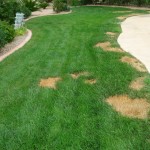Urine. Some veterinarians call it “liquid gold” because it has incalculable value in determining a dog’s health status. However, puppy owners who have to clean it up call it a waste product. Likewise for people who take pride in their lawns. To them, dog urine is a force that wreaks havoc on their pristine green carpets.
 Urine scalding of grass is so upsetting to some people that they won’t allow their dogs access to their beautifully manicured lawns. Others try to limit unsightly yellow urine stains by adding ingredients such as baking soda or apple cider vinegar to their dogs’ foods. These are seldom, if ever, effective.
Urine scalding of grass is so upsetting to some people that they won’t allow their dogs access to their beautifully manicured lawns. Others try to limit unsightly yellow urine stains by adding ingredients such as baking soda or apple cider vinegar to their dogs’ foods. These are seldom, if ever, effective.
To minimize urine damage to grass, it is important to understand the factors that affect it. The first is the makeup of the dog’s urine itself. The second is the natural resistance of the grass and soil to the effects of urine.
The sex of the dog also influences urine damage. Female dogs tend to urinate large amounts in one spot. Males urinate in little bits, and often not in the middle of the lawn. This makes urine scalding of lawns almost entirely a female dog problem.
Urine has three important characteristics – urine pH (acidity/alkalinity), nitrogen content, and salinity – that influence its effect on grass.
Despite common beliefs, changing the pH of a dog’s urine has a very limited effect on lawn health. As well, after a short while on supplement, like baking soda or vinegar, the dog’s body adjusts and brings the pH back into the normal range.
Nitrogen content in the urine is the most significant factor that impacts grass health. It burns grass in the same way as excessive fertilizer. But, the surrounding grass grows well from this natural fertilizer.
Urine salinity – the salt content – is the last factor. Concentrated urine has more salt (and more urea) than dilute urine. When the buffering ability of the soil can’t handle the amount of salt and nitrogen in the urine, the grass dies.
You can dilute the urine and avoid the effects of high nitrogen and salinity. You can save your grass by following your dog around with a bucket of water and immediately splashing it over her urine spots. Or, you can get your dog to drink more water to make her urine more dilute and less toxic. This is not practical.
The most effective way to combat lawn death from urine is to build up the soil’s natural buffers. This can be done by leaving grass clippings on your lawn or sprinkling compost, peat moss, or wood ashes on your grass. Under these conditions, the soil has a better ability to withstand a sudden dump of nitrogen, sparing the grass.
The last way to prevent urine scalding is to train your dog. Simply teach her to urinate in an area where scalding marks are of little consequence. This way, it won’t matter how often she urinates, whether her urine is acidic or alkaline, or whether it is too concentrated.
Dr. Louise Janes D.V.M. & Dr. Jeff Grognet D.V.M. Mid-Isle Veterinary Hospital
Mid-Isle Veterinary Hospital
5-161 Fern Road West
Qualicum Beach, BC
Tel (250) 752-8969
Mid-Isle Veterinary Hospital
See all articles by Dr. Louise Janes D.V.M. & Dr. Jeff Grognet D.V.M.



